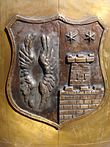Zrínyi
| Zrinski | |
|---|---|
 |
|
| Country | |
| Parent house | House of Šubić |
| Titles | Counts of Zrin (Croatian: knezovi Zrinski), Ban of Croatia |
| Founded | 1347 |
| Founder | Juraj I Zrinski (although his uncle Grgur II. Bribirski was the first lord of Zrin, acting on behalf of his minor nephew, Juraj III Bribirski was the first to call himself Zrinski) |
| Final ruler | Ivan Antun Zrinski |
| Current head | Extinct |
| Dissolution | 1703 |
Zrinski (Hungarian: Zrínyi) was a Croatian-Hungarian noble family, influential during the period in history marked by the Ottoman wars in Europe in the Kingdom of Hungary and Croatia and in the later Austro-Hungarian Empire. Notable members of this family were Bans (viceroys) of Croatia, considered national heroes in both Croatia and Hungary, and were particularly celebrated during the period of romanticism; this movement was called Zrinijada in Croatian.
The Zrinski or Zrínyi, meaning "those of Zrin", are a branch of the Šubić family, which arose when king Louis I of Hungary needed some of the Šubićs' fortresses for his coming wars against Venice, and the city of Zadar in particular.
In 1347, Louis I took their estates around Bribir in the Hrvatsko Primorje hinterlands and gave them the Zrin estate with Zrin Castle in the Croatian region of Banovina, south of the modern city of Petrinja and west of Hrvatska Kostajnica. Since that time they are known as the Counts of Zrin in historical sources. Later, their power steadily increased, so that they acquired the territory between the rivers Krka and Zrmanja and the sea by the 13th century. At the outset of the 14th century, Paul I Šubić of Bribir was the longest-ruling Ban of Croatia (1275–1312), as well as lord of all of Bosnia (1305-1312). His son was Paul II Šubić of Bribir.
...
Wikipedia
